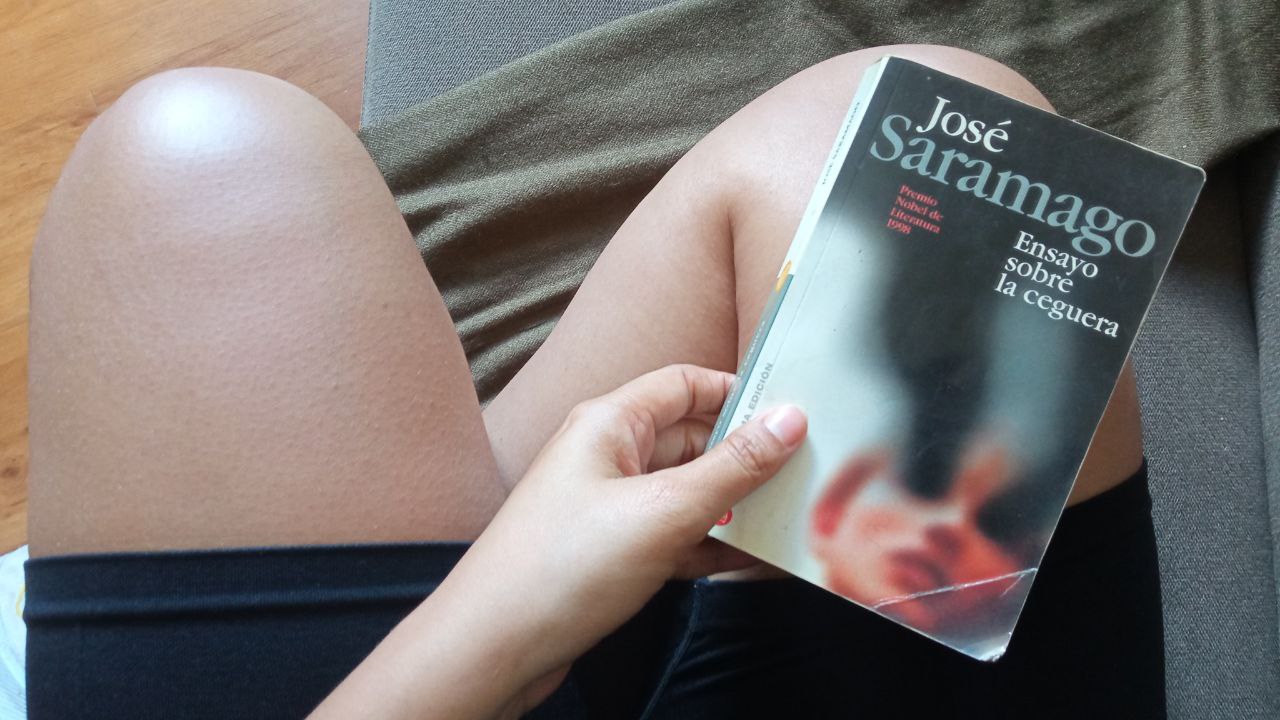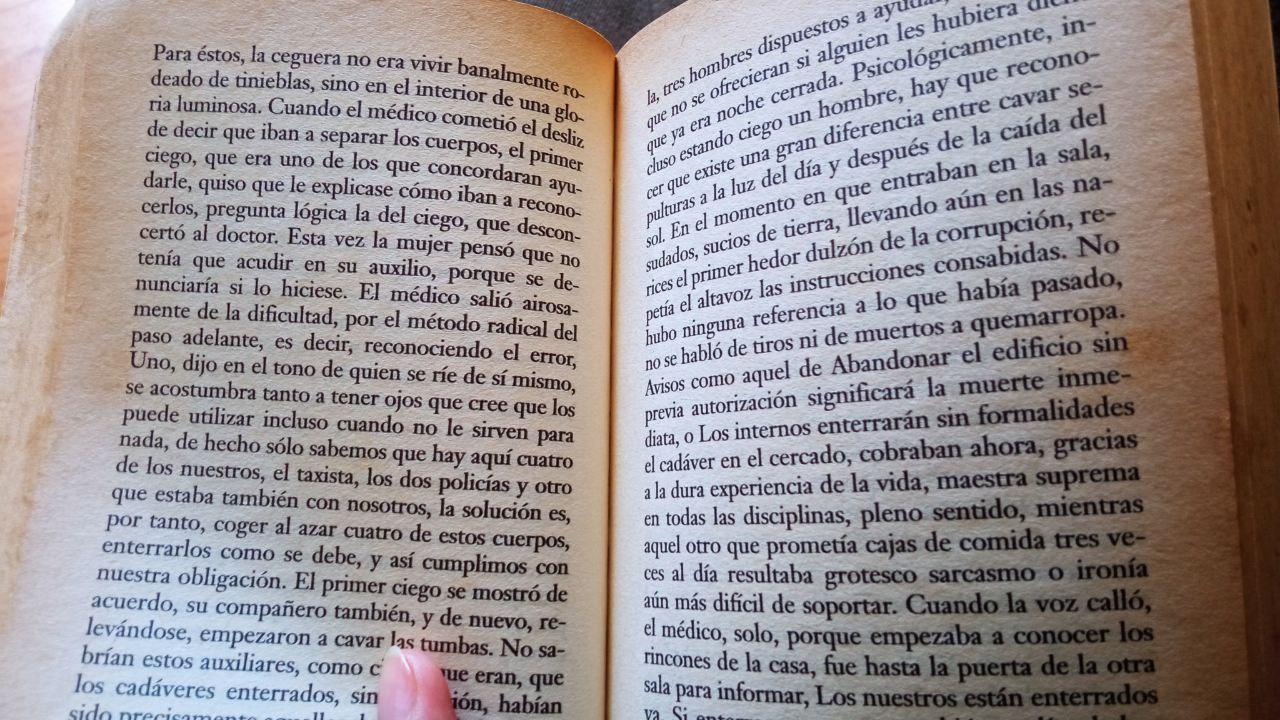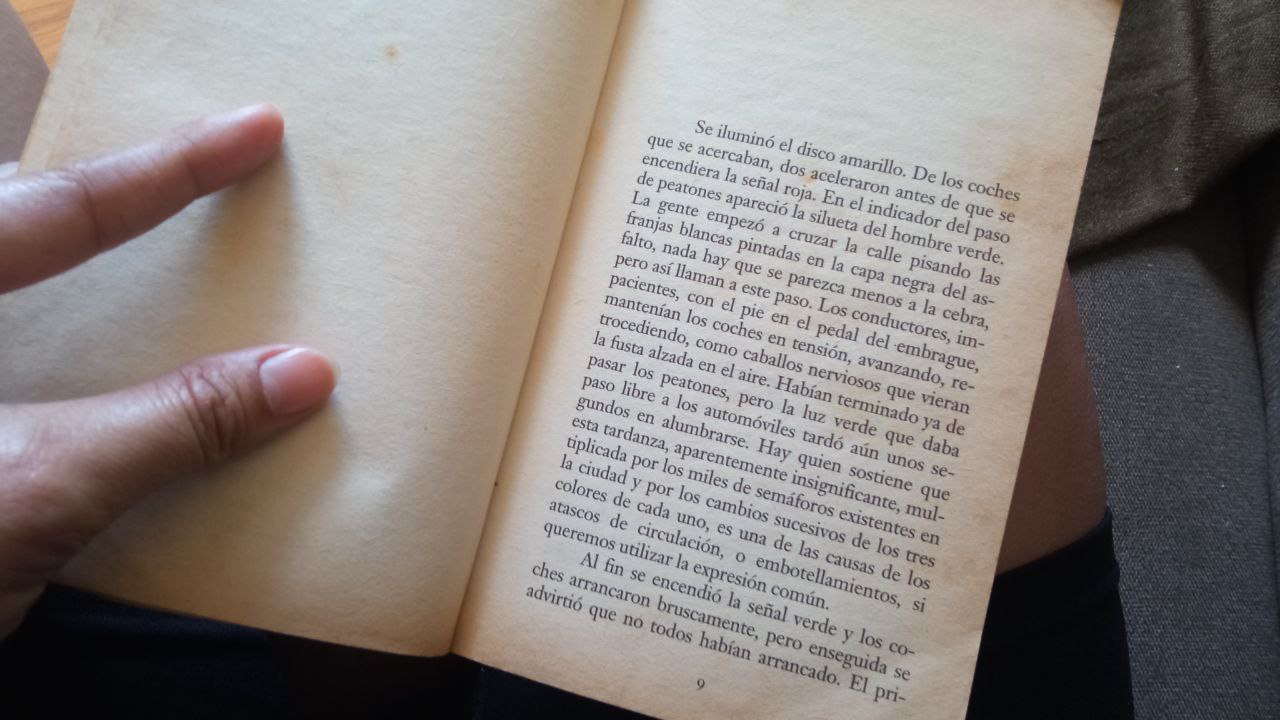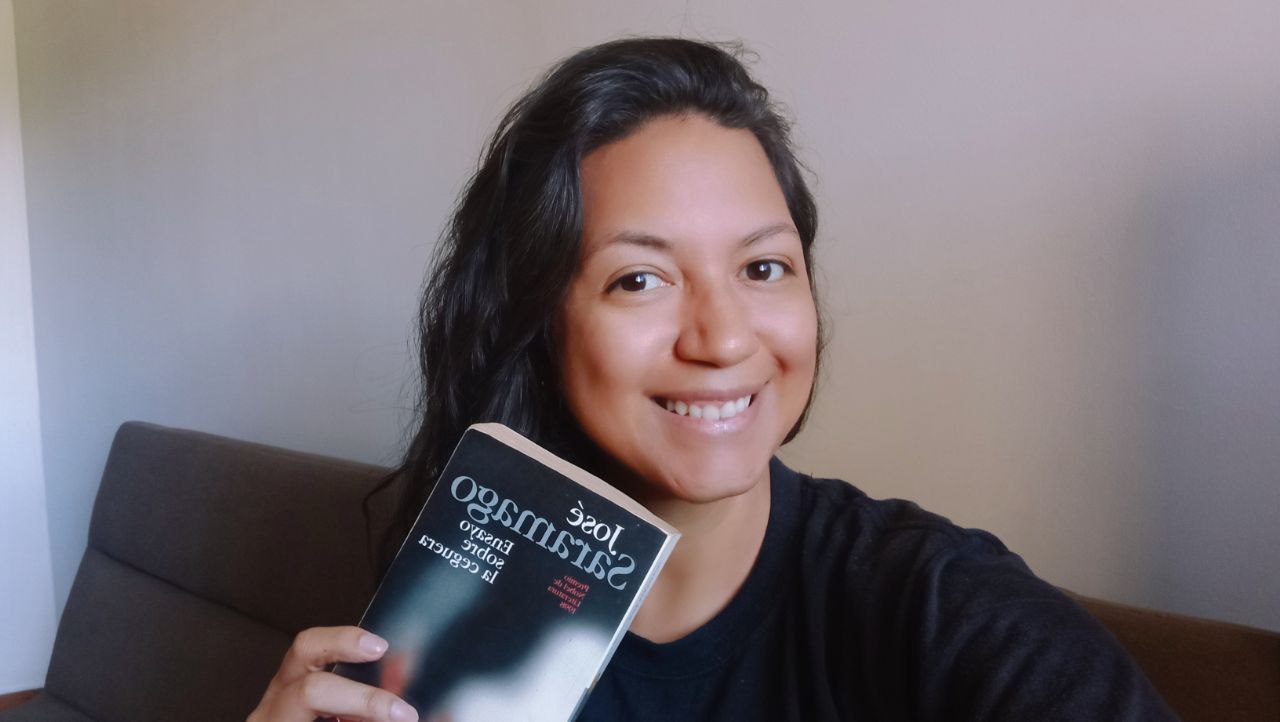When I first got to know the literary work of José Saramago, I was reading his book The Elephant's Journey and I was captivated by his way of walking through words and telling stories. That's why I kept looking for more about him until I came to Essay on Blindness, a book that caught me, it talked about a situation full of chaos, fear and catastrophe in the middle of a situation that I never imagined and that also left me with a persistent question about human nature and the fragility of civilisation. Before I tell you what that question was, I want to tell you a little about this work by José Saramago.
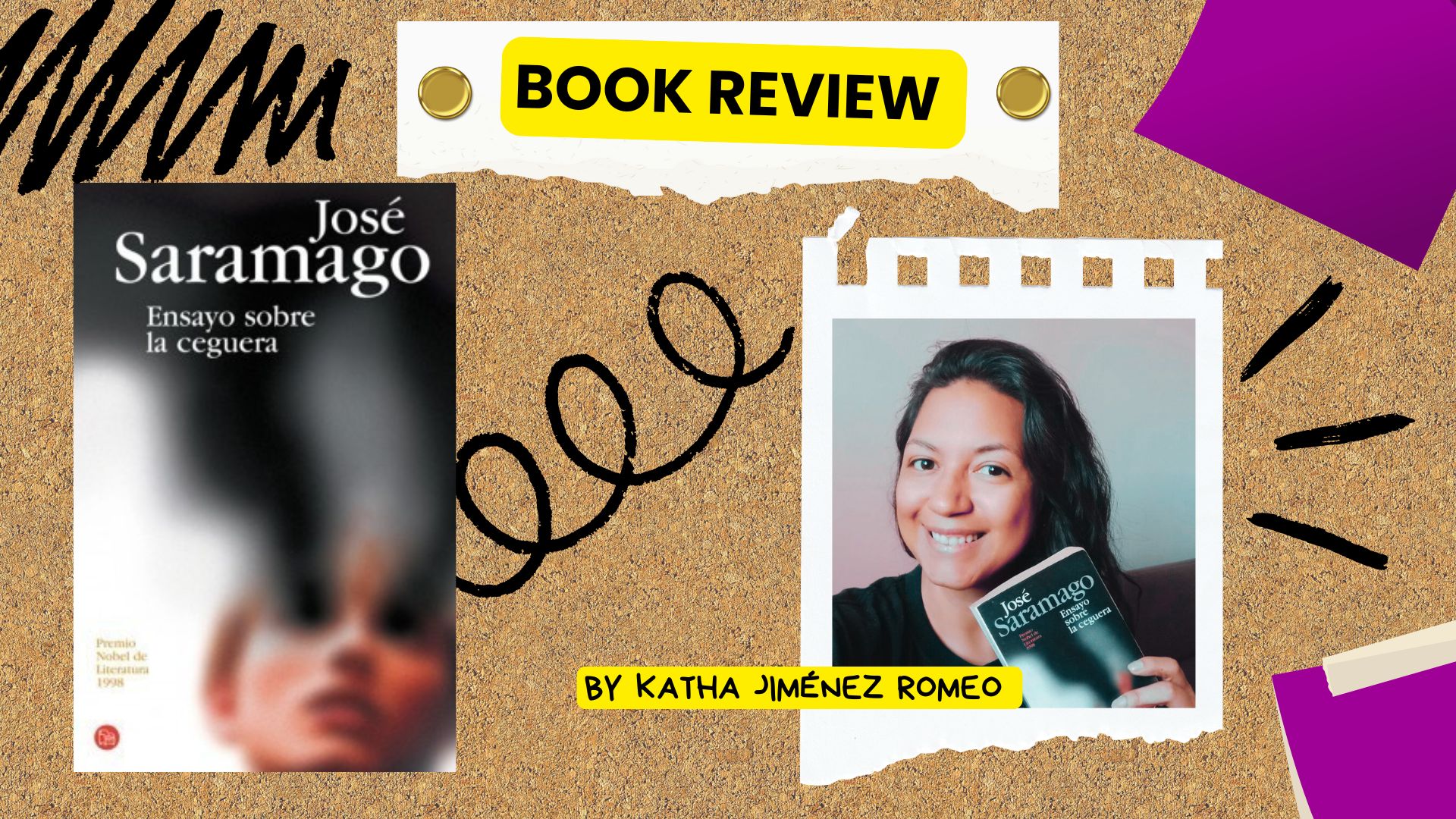
Hello my Hive Book Club people, I'm stopping by to talk about this book: ‘Essay on Blindness’ by José Saramago, this book tells the story of a terrifying and allegorical pandemic of ‘white blindness’, a sudden loss of vision that plunges the world into chaos and brutality. The story begins with a man who inexplicably goes blind while driving. The blindness spreads rapidly, affecting the majority of the population.
In the book Saramago depicts a government, unable to control the situation, decides to isolate the blind in an old asylum. Within this forced confinement, civility quickly crumbles. Without the ability to see each other and with increasing scarcity of resources, the baser, more selfish instincts of human nature emerge. Hierarchies of power based on force form, and violence, exploitation and degradation become the norm for survival.
As I progressed through the book, the author told the story of a small group, led by the wife of an ophthalmologist (who mysteriously retains her sight), struggling to maintain their humanity and protect themselves from increasing barbarism. She becomes their eyes and moral guide, witnessing the horrors that humans are capable of when they are stripped of their sight and, metaphorically, their capacity for empathy and reason.
Through the terrible experiences of the blind, Saramago explores profound themes such as the fragility of civilisation, the nature of humanity under extreme conditions, the importance of solidarity and empathy, and moral responsibility. White blindness’ becomes a powerful metaphor for moral blindness, indifference and the loss of values in society.
Eventually, as inexplicably as it began, the blindness begins to fade. However, the world to which those who regain their sight return is deeply scarred by the experience, raising questions about whether they have really ‘seen’ anything beyond their physical blindness and whether humanity will learn from this terrible lesson. The book is a scathing critique of contemporary society and a reflection on the essence of what it means to be human.
I particularly enjoyed this book very much, I read it about 5 years ago and I still remember myself speechless reading the pages of this book that left me with a bittersweet and deeply disturbing feeling. Because to tell the truth there is no optimistic and comforting conclusion, but rather a lingering question about human nature and the fragility of civilisation.
Do you think we as human beings will be able to ‘see’ beyond our own selfish blindness and build a more humane and compassionate society, or are we doomed to repeat the horrors we have witnessed?
SPANISH (click here!)
Cuando conocí el trabajo literario de José Saramago estaba leyendo su libro el viaje del elefante y quedé prendada de esa manera suya de pasearse por las palabras y contar las historias. Por eso seguí buscando más sobre él hasta que llegué al Ensayo sobre la ceguera un libro que me atrapó, hablaba sobre una situación llena de caos, miedo y catástrofe en medio de una situación que jamás imaginé y que además me dejó una interrogante persistente sobre la naturaleza humana y la fragilidad de la civilización. Antes de decirte cuál fue la interrogante quiero contarte un poco sobre esta obra de José Saramago.

Hola mi gente de Hive Book Club, paso por aquí para hablar sobre este libro: “Ensayo sobre la ceguera” de José Saramago, este libro nos narra la historia una aterradora y alegórica pandemia de "ceguera blanca", una repentina pérdida de visión que sumerge al mundo en el caos y la brutalidad. La historia comienza con un hombre que inexplicablemente se queda ciego mientras conduce. La ceguera se propaga rápidamente, afectando a la mayoría de la población.
En el libro Saramago plantea a un gobierno, incapaz de controlar la situación, decide aislar a los ciegos en un antiguo manicomio. Dentro de este confinamiento forzado, la civilidad se desmorona rápidamente. Sin la capacidad de verse y con la creciente escasez de recursos, los instintos más básicos y egoístas de la naturaleza humana emergen. Se forman jerarquías de poder basadas en la fuerza, y la violencia, la explotación y la degradación se convierten en la norma para la supervivencia.
A medida que avancé en el libro, el autor fue contando la historia de un pequeño grupo, liderado por la esposa de un oftalmólogo (quien misteriosamente conserva la vista), lucha por mantener su humanidad y protegerse de la creciente barbarie. Ella se convierte en sus ojos y en su guía moral, presenciando los horrores a los que son capaces de llegar los seres humanos cuando se despojan de la visión y, metafóricamente, de su capacidad de empatía y razón.
A través de las terribles experiencias de los ciegos, Saramago explora temas profundos como la fragilidad de la civilización, la naturaleza de la humanidad bajo condiciones extremas, la importancia de la solidaridad y la empatía, y la responsabilidad moral. La "ceguera blanca" se convierte en una poderosa metáfora de la ceguera moral, la indiferencia y la pérdida de valores en la sociedad.
Finalmente, de manera tan inexplicable como comenzó, la ceguera comienza a desaparecer. Sin embargo, el mundo al que regresan los que recuperan la vista está profundamente marcado por la experiencia, planteando interrogantes sobre si realmente han "visto" algo más allá de su ceguera física y si la humanidad aprenderá de esta terrible lección. El libro es una crítica mordaz a la sociedad contemporánea y una reflexión sobre la esencia de lo que significa ser humano.
Yo en lo particular me disfruté muchísimo este libro, lo leí hace unos 5 años aproximadamente y aún me recuerdo boquiabierta leyendo las páginas de este libro que me dejó una sensación agridulce y profundamente inquietante. Porque a decir verdad no hay una conclusión optimista y reconfortante, sino más bien una interrogante persistente sobre la naturaleza humana y la fragilidad de la civilización.
¿Crees que como seres humanos seremos capaces de "ver" más allá de nuestra propia ceguera egoísta y construir una sociedad más humana y compasiva, o estamos condenados a repetir los horrores presenciados?
Las fotos y contenido aquí compartido con ustedes son de mi autoría. Las fotos fueron tomadas con mi teléfono Redmi Xiaomi 9. El diseño fue realizado con la versión gratuita de CANVA. La portada del libro fue descargada de manera gratuita de goodreads. La traducción al inglés fue realizada con DeepL
The photos and content shared with you here are my own. The photos were taken with my Redmi Xiaomi 9 phone. The design was made with the free version of CANVA. The book cover was downloaded for free from goodreads. The English translation was done with DeepL

